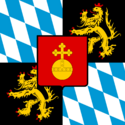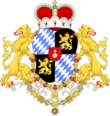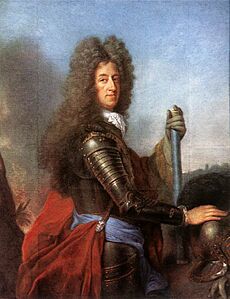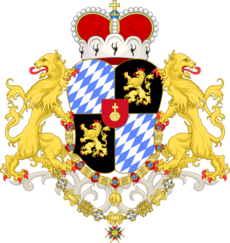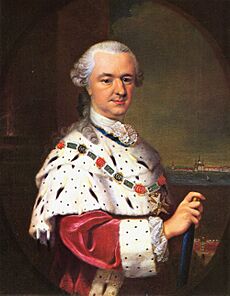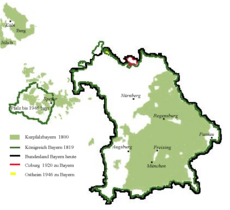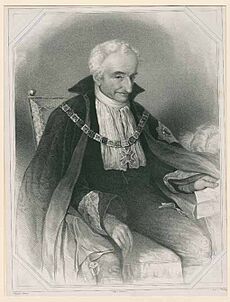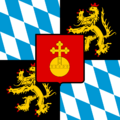Electorate of Bavaria facts for kids
Quick facts for kids
Electorate of Bavaria
Kurfürstentum Bayern (German)
|
|||||||||
|---|---|---|---|---|---|---|---|---|---|
| 1623–1806 | |||||||||
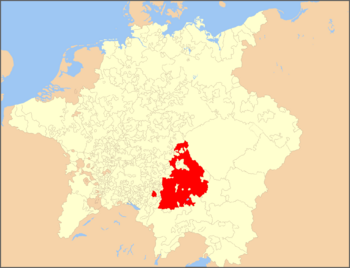
Bavaria highlighted on a map of the Holy Roman Empire in 1648
|
|||||||||
| Status | Electorate | ||||||||
| Capital | Munich | ||||||||
| Religion | Catholic Church | ||||||||
| Demonym(s) | Bavarian | ||||||||
| Government | Feudal monarchy | ||||||||
| Elector of Bavaria | |||||||||
|
• 1623–1651
|
Maximilian I, Elector of Bavaria | ||||||||
|
• 1651–1679
|
Ferdinand Maria, Elector of Bavaria | ||||||||
|
• 1679–1726
|
Maximilian II Emanuel, Elector of Bavaria | ||||||||
| Historical era | Early modern Europe | ||||||||
|
• Granted electoral dignity
|
1623 | ||||||||
|
• Peace of Westphalia
|
1648 | ||||||||
|
• Put under Imperial Ban
|
1706 | ||||||||
|
• Imperial Ban reversed
|
1714 | ||||||||
1777 |
|||||||||
|
• Raised to Kingdom
|
1806 | ||||||||
|
|||||||||
The Electorate of Bavaria (which means Kurfürstentum Bayern in German) was an important state in the Holy Roman Empire. It existed from 1623 to 1806. During this time, Bavaria was led by a special ruler called an Elector. This Elector had the important job of helping to choose the Holy Roman Emperor.
The Electorate of Bavaria was a powerful place. It was ruled by the Wittelsbach family. This family also ruled another area called the Electoral Palatinate. In 1623, Bavaria gained the right to be an Electorate. This happened after Frederick V, Elector Palatine lost his title. His cousin, Duke Maximilian I of Bavaria, received this special honor.
Bavaria remained an Electorate until 1806. In that year, it became the Kingdom of Bavaria. This change made Bavaria even more important in Europe.
Contents
Where Was the Electorate of Bavaria?
The Electorate of Bavaria covered much of what is now Upper Bavaria, Lower Bavaria, and the Upper Palatinate in modern Germany. Before 1779, it also included a region called the Innviertel. This area is now part of Austria. It was given to the Habsburg family after the War of the Bavarian Succession.
Inside Bavaria, there were also some smaller, independent areas. These included church-ruled states like Freising and Regensburg. There was also the free city of Regensburg. For easier management, Bavaria was divided into five main areas called "stewardships."
What Did an Elector Do?
Being an Elector of Bavaria meant having many important roles.
- Voting for the Emperor: The Elector was a member of the Council of Electors. This group voted for the new Holy Roman Emperor.
- Archsteward: The Elector was also the Archsteward of the Holy Roman Empire. This was a very high-ranking official position.
- Imperial Vicar: Sometimes, when there was no Emperor, the Elector of Bavaria acted as the Imperial Vicar. This meant he temporarily took on some of the Emperor's duties. He did this several times, like in 1657–1658 and 1740–1742.
- Leading Regional Groups: The Elector also helped lead the Bavarian Circle. This was a group of states in the Holy Roman Empire that worked together.
After 1777, the Elector of Bavaria also gained control of many lands from the Palatinate family. These included the Electoral Palatinate and the duchies of Jülich and Berg.
Key Moments in Bavarian History
Bavaria During the Thirty Years' War
When Maximilian I became ruler in 1597, Bavaria was in trouble. It had many debts and was disorganized. But Maximilian was a strong leader. He worked hard to fix the finances and the legal system. He also created a group of civil servants and a national army.
These changes made Bavaria strong and orderly. This strength allowed Maximilian to play a big part in the Thirty Years' War. During the early years of the war, he was very successful. He gained control of the Upper Palatinate. Most importantly, he received the special title of Elector. This title had belonged to another branch of his family since 1356.
Even though Bavaria faced some tough times later in the war, Maximilian kept these gains. The Peace of Westphalia in 1648 confirmed his new status. The war caused a lot of damage, especially in northern Bavaria. But Maximilian worked to repair it. When he died in 1651, Bavaria was much stronger and more influential than before. It could now play a bigger role in European politics.
Bavaria's Absolute Rulers
After Maximilian I, his son Ferdinand Maria (1651–1679) took over. He was young, but he did a lot to help Bavaria recover from the Thirty Years' War. He encouraged farming and industries. He also built and repaired many churches and monasteries.
However, Ferdinand Maria's son, Maximilian II Emanuel (1679–1726), had big ambitions. He wanted to make Bavaria even more powerful. This led him to fight in wars, including the War of the Spanish Succession. He sided with France and suffered a major defeat at the Battle of Blenheim in 1704. Because of this, his lands were temporarily taken away. They were only given back to him in 1714. During this time, there was even a peasant uprising in Bavaria against the Austrian occupiers.
Maximilian II Emanuel's son, Charles Albert (1726–1745), also wanted to increase Bavaria's power. When the Emperor died, Charles Albert tried to become the new Emperor himself. He allied with France and was crowned King of Bohemia and then Emperor in 1742. But this led to Austrian troops occupying Bavaria. He died in 1745, leaving his successor to make peace.
Maximilian III Joseph (1745–1777) became the next Elector. He signed a treaty to get his lands back. He was a ruler who believed in new ideas, like those of the Enlightenment. He supported farming and industries. He also founded the Academy of Sciences in Munich. When he died in 1777 without children, the main line of the Wittelsbach family in Bavaria ended.
Bavaria and the Palatinate Unite
After Maximilian III Joseph died, the rule of Bavaria passed to Charles Theodore. He was the Elector Palatine, meaning he ruled the Palatinate lands. This event reunited Bavaria with the Palatinate after more than 400 years. This made Bavaria much larger and stronger.
However, Austria was worried about this new, powerful neighbor. Austria claimed some parts of Bavaria. This led to the War of Bavarian Succession. In the end, a peace treaty in 1779 gave a small part of Bavaria (the Innviertel) to Austria. But it confirmed that Charles Theodore would rule the rest of Bavaria.
Charles Theodore didn't do much good for Bavaria. He felt like a stranger there. He even tried to trade Bavaria for other lands. He also stopped many of the good changes his predecessor had started. Bavaria's intellectual and social progress slowed down during his rule.
The French Revolution and Napoleon's Era
In 1792, the French Revolutionary Army invaded the Palatinate. By 1795, the French entered Bavaria itself. The Elector, Charles Theodore, fled. Bavaria was caught between the French and the Austrians.
When Charles Theodore died in 1799, Maximilian IV Joseph became the new Elector. He faced a very difficult situation. His minister, Maximilian von Montgelas, believed Bavaria's best chance was to ally with France. In 1800, the Bavarian army was defeated alongside the Austrians. Bavaria lost some of its lands in a treaty with France in 1801.
Montgelas then worked to form a strong alliance with France. This alliance proved very beneficial for Bavaria. In 1803, Napoleon reorganized many states in Germany. Bavaria gained new territories, including several bishoprics and free cities. These new lands made Bavaria more compact and larger. Montgelas wanted Bavaria to become a major European power. He skillfully managed Bavaria's relationship with France, making sure it remained strong but not completely controlled by France.
Bavaria Becomes a Kingdom
In September 1805, Bavaria officially allied with Napoleon's France. Bavarian troops fought alongside the French against Austria. This alliance led to a major French victory at the Battle of Austerlitz in December 1805.
As a reward for its loyalty, Bavaria gained even more land from Austria in the Treaty of Pressburg. This included areas like Vorarlberg and Tyrol. The treaty also recognized that the Elector of Bavaria could now call himself a King.
On January 1, 1806, Duke and Elector Maximilian IV Joseph was officially proclaimed King Maximilian I Joseph of Bavaria. This was a huge step up for Bavaria. The Electorate of Bavaria officially ended in 1806 when it became a kingdom. Bavaria then formally left the Holy Roman Empire. The Holy Roman Empire itself was dissolved later that year, ending a thousand years of history.
Images for kids
 | Jewel Prestage |
 | Ella Baker |
 | Fannie Lou Hamer |


